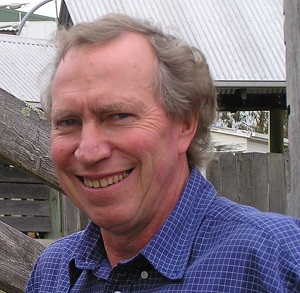Emeritus Professor James Rowe OAM
South African born Professor James Rowe emigrated to Australia to follow his interest in agriculture, completing his Bac helor of Rural Science and PhD in ruminant nutrition at UNE.
helor of Rural Science and PhD in ruminant nutrition at UNE.
James’ family already had a strong connection with Australia. His grandfather grew up here before going to South Africa to the Boer War, and his great uncle studied at Wagga Ag College, before joining his brother to farm in the Limpopo region of South Africa.
James reflects on his years at UNE fondly, appreciating the College system and his fellow Rural Science students, saying, “The interaction with the close-knit year group was always enjoyable, and many of these have remained close friends”.
Upon completing his PhD, James’ first position was with the United Nations Development Program, working under Dr Reg Preston in the Dominican Republic. The two-year assignment kick started what was to become a rewarding and extensive career in both sheep and cattle production, as it focused on developing feeding systems for beef and dairy cattle based on sugar cane and its by-products, and other production systems that revolved around banana, cassava and leucaena by-products.
The UK was James’ next career path destination, with two years spent working with ICI’s Pharmaceutical Division (now Astra Zeneca), exploring methods of altering gut fermentation – the goal being to reduce methane production and increase energy retention in sheep and cattle production systems.
With a desire to return to Australia and focus his efforts on the sheep industry here, James joined the Western Australia Department of Agriculture, based in Perth, as a research officer working on the nutritional management of sheep, focusing on the impact of nutrition on reproductive performance and wool production, especially during the dry summer months.
“My work in Western Australia included studies on the nutritional features of lupins, as well as working on controlling acidosis in sheep, cattle and horses. Research on acidosis led to the development of the feed additives Eskalin (for safe feeding of grains to ruminants) and Founderguard (for reducing the risk of laminitis in horses).”
The positive benefits of collaboration across different scientific disciplines became very apparent during James’ time in W.A.; his research led him to work with Dr Norm Adams from the CSIRO (reproductive physiology) and Dr Dave Pethick of Murdoch University (nutritional biochemistry and physiology). Strong relationships were also forged with the private sector, working with sheep and cattle producers, as well as commercial feed manufacturers.
For the last six years of his time in W.A., James was the Head of Cattle Industry R&D, which afforded him more chances to take on leadership and management responsibilities – standing him in good stead for his future career progression.
In 1994, James was approached by UNE to apply for the position of Professor and Head of Animal Sciences. A new department of Animal Sciences had recently been formed by amalgamating the Department of Animal Husbandry and Department of Biochemistry and Nutrition. UNE was also the headquarters for Beef and Fine Wool CRCs (Cooperative Research Centres). It was an opportunity James couldn’t turn down.
“It was quite daunting to consider returning to UNE to lead a department that included a number of academics who had taught me as a Rural Science undergraduate, my postgraduate supervisors, and many senior academics and researchers,” James said.
However, James accepted the challenge and enjoyed the range of activities that included undergraduate teaching, supervising postgraduates and further research on acidosis in collaboration with Pfizer Animal Health, culminating in a six-month sabbatical at Pfizer’s research headquarters in Connecticut.
In 1999 the Premium Wool CRC’s future looked doubtful, so James began to work with Dr Rob Woolaston, the Officer in Charge of the CSIRO’s Chiswick Research Station, on planning a “Sheep CRC”. Wool had always been the dominant player in sheep industry research, with very little cross-over between wool and sheep meat R&D. The aim of the new CRC was to understand how to get the most out of integrated wool and meat production systems.
James’ hard work with Rob Woolaston and others paid off, and he was appointed CEO of the new CRC in 2001. The CRC was subsequently successful in being granted a second seven-year term in 2007, and a final five-year extension from 2014 - 2019, when it finally ceased operation.
James says his 19 years with the Sheep CRC was a very positive experience. The close links between industry and researchers, and the emphasis on research and its adoption by end-users, was very satisfying.
Reflecting on his career and achievement, and what has been his prime motivator for working within the sheep and cattle industry for many years, James remarks: “Giving back to the industry is important to me. The Wool Board, now the AWI (Australian Wool Innovation), gave me a start in funding my PhD scholarship. I have always appreciated industry’s support for my research and accepted the responsibility that goes with it to deliver innovation that repays this investment.
“Working in collaboration with leading producers and talented researchers across many aspects of livestock production and animal science has been most enjoyable. Over the years there have been a number of wins and it is very satisfying to be able to look back on these team achievements.”
As for what’s next…
“Post CRC, I hope to continue contributing to the livestock industries by assisting with the development of integrated programs of R&D, particularly those that involve collaboration between researchers in different disciplines, as well bringing together organisations that have complementary resources and capabilities.”

